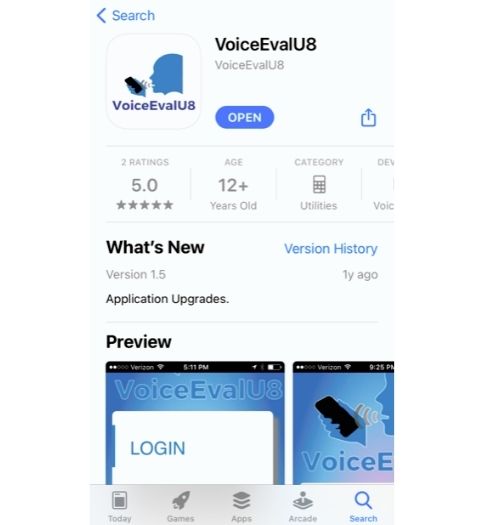WCU Professor Awarded 2nd National Institutes of Health (NIH) Grant to Expand Groundbreaking Research on Innovative Method of Vocal Health Delivery
COVID-19 Pandemic Prompts Treatment of Voice Problems Primarily via Telepractice
 Professor of Communication Sciences and Disorders Liz Grillo is the first at West
Chester University (WCU) to receive two grants from the National Institutes of Health
(NIH), which total $797,000, for groundbreaking research on an innovative method of
vocal health delivery ---- telepractice. Emerging as a critical mode of health delivery
as a result of the COVID-19 pandemic, telepractice focuses on the delivery of speech-language
pathology services at a distance, as well as the development of mobile apps that run
on Apple and Android smartphones to help people with voice problems. Behavioral voice
therapy delivered through telepractice, and as conducted by speech-language pathologists,
has rapidly grown to be the primary method to prevent and treat voice problems due
to social-distancing requirements prompted by the COVID-19 pandemic.
Professor of Communication Sciences and Disorders Liz Grillo is the first at West
Chester University (WCU) to receive two grants from the National Institutes of Health
(NIH), which total $797,000, for groundbreaking research on an innovative method of
vocal health delivery ---- telepractice. Emerging as a critical mode of health delivery
as a result of the COVID-19 pandemic, telepractice focuses on the delivery of speech-language
pathology services at a distance, as well as the development of mobile apps that run
on Apple and Android smartphones to help people with voice problems. Behavioral voice
therapy delivered through telepractice, and as conducted by speech-language pathologists,
has rapidly grown to be the primary method to prevent and treat voice problems due
to social-distancing requirements prompted by the COVID-19 pandemic.
Addressing critical barriers in voice therapy, Professor Grillo’s research will result in the development of a new voice app that people will be able to use multiple times each day to practice healthy voice behaviors in their everyday lives. Voice therapy concepts will also be tested in a clinical study designed to improve knowledge about concepts that facilitate client-centered outcomes for prevention and treatment of voice problems. Students studying to be teachers at WCU and professional teachers with voice complaints in southeastern Pennsylvania will be recruited to participate in the clinical study.
As vocal athletes, teachers are perfect examples of how telepractice can be used effectively. Estimates indicate that 60% of teachers, who depend upon their voice for work, are regularly affected by voice problems. This phenomenon leads to increased costs to the healthcare system and negative effects on students’ learning abilities in the classroom. A new effect has resulted. With the ongoing pandemic, teachers in schools are now required to wear face masks, which is putting an additional strain on the voice system.
Teachers, however, are not alone. Voice problems are a significant public health concern affecting 3-9% (9-29 million) of the U.S population by limiting a person’s ability to participate in society with an economic burden of $11 billion annually.
“Voice, one aspect of communication, is defined by vocal quality, pitch, loudness, and resonance of the acoustic signal,” says Professor Grillo, who is a renowned speech-language pathologist with clinical expertise in voice disorders and medical speech-language pathology. “Telepractice targets people’s needs in the environment, reduces costs, and improves access to services. To date and in real-time, videoconferencing has been the focus of most telepractice research with information that is stored and accessed later via mobile apps being used only minimally.”
As Professor Grillo’s second NIH grant dedicated to the study of telepractice, this three-year research initiative totals $387,148 (September 15, 2021-August 31, 20244). Throughout the grant-funded project, Professor Grillo will work closely with student research assistants in the Department of Communication Sciences and Disorders in the College of Health Sciences at West Chester University.
